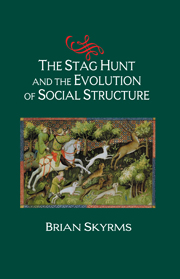2 - Bargaining with Neighbors
Published online by Cambridge University Press: 05 June 2012
Summary
JUSTICE
WHAT is justice? The question is harder to answer in some cases than in others. Philosophers usually like to discuss the hard cases, in which disagreement is inevitable. Here we will focus on the easiest case of distributive justice. Two individuals are to decide how to distribute a windfall of a certain amount of money. Neither is especially entitled, or especially needy, or especially anything — their positions are entirely symmetric. Their utilities derived from the distribution may, for all intents and purposes, be taken simply as the amount of money received. If they cannot decide, the money remains undistributed and neither gets any. The essence of the situation is captured in the simplest version of a bargaining game devised by John Nash in 1950. Each person decides on a bottom-line demand. If those demands do not jointly exceed the windfall, then each person gets his or her demand; if not, no one gets anything. This game is often simply called “divide-the-dollar.” One can imagine countless other bargaining games, but for the moment we examine the evolutionary dynamics of this one.
In the ideal simple case, the question of distributive justice can be decided by two principles:
Optimality: A distribution is not just if under an alternative distribution all recipients would be better off.
Equity: If the position of the recipients is symmetric, then the distribution should be symmetric. That is to say, it does not vary when we switch the recipients.
Since we stipulate that the position of the two individuals is symmetric, equity requires that the just distribution must give them the same amount of money.
- Type
- Chapter
- Information
- The Stag Hunt and the Evolution of Social Structure , pp. 17 - 30Publisher: Cambridge University PressPrint publication year: 2003



